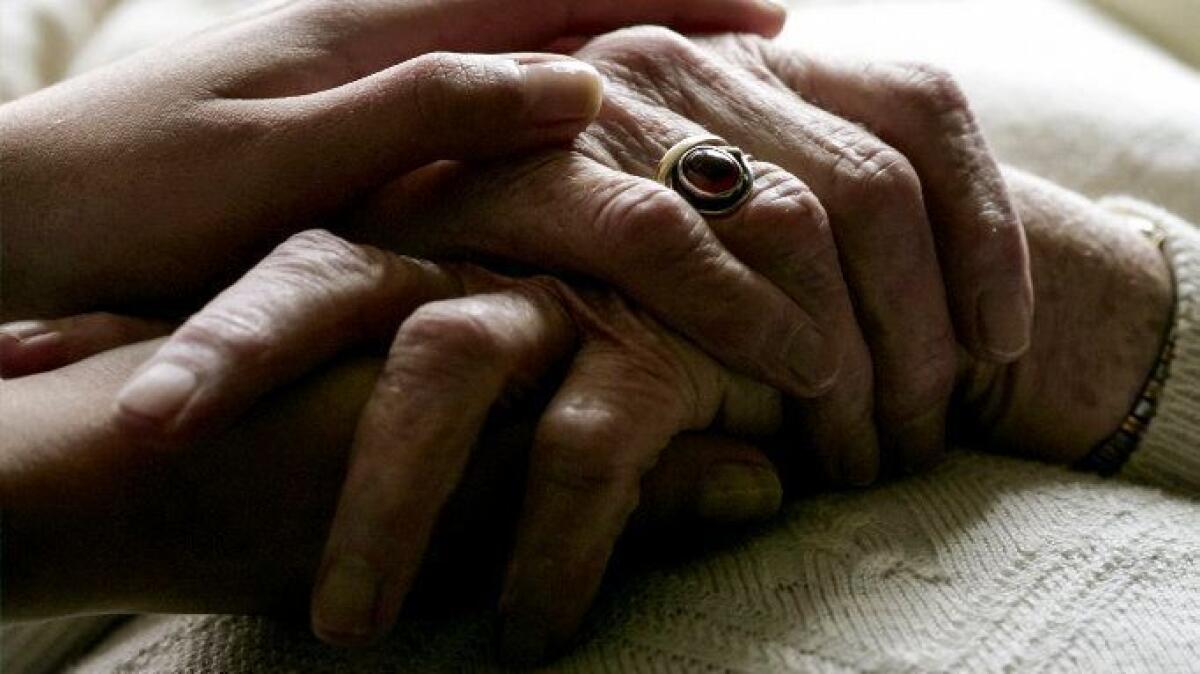What the death of a parent can teach us, if we’re willing to learn

- Share via
The death of a parent can send shock waves through your self-perception and reposition the mental space you occupy on the planet. The grief can be life changing. Think you’re noticing a higher than usual number of people posting on Facebook about a parent passing recently? You’re right. Studies show death rates spike near the holidays, with January taking the highest toll. We asked experts to share their insights and experiences, as well as advice on managing the pain, and how to emerge enlightened during this challenging time.
It’s hard because... it’s hard
“We tend to think of ourselves as ‘children’ until we lose our parents. It is only then that we are on the front line of mortality,” said Debra J. Umberson, professor of sociology at the University of Texas at Austin and author of the book “Death of a Parent: Transition to a New Adult Identity.” “This gives us a very different perspective on our own lifespans and where we fit in terms of generations.”
David Kessler, founder of grief.com and co-author with Dr. Elisabeth Kübler-Ross of the influential book “On Grief and Grieving: Finding the Meaning of Grief Through the Five Stages of Loss,” said many adults — regardless of age — struggle with feeling like an orphan after a parent dies. “I try to remind them that you still stay connected with that person even in death.”
‘An era gone by’
“Our parents are our first relationship… So when a parent dies, it is your anchor being taken away,” Kessler said. Los Angeles resident Abbe Andersen took care of her mother, who had Alzheimer’s, and when she died at 88, Andersen felt her point of life reference had died, too. “It’s a lost feeling,” she said. But it also allowed her to rethink and reshift personal priorities: “What’s important are your connections… dear friends and family.”
Rituals can help
“Having a place that reminds the child of the parent and going to that place to talk things through with the parent can be very comforting,” Umberson said. Planting a tree, or assembling a special photo album or scrapbook can also help.
Grieving what never was
Some are perplexed to find themselves mourning a parent with whom they’ve had a bad relationship. “We believe we only grieve people we love but that actually isn’t true,” Kessler said. “My definition of grief is a reflection of a connection we have lost… Sometimes we have to grieve for what never was, for that ideal parent we never had.”
For some, a new freedom
Jeanne Safer, author of “Death Benefits: How Losing a Parent Can Change an Adult’s Life – for the Better” — the book cover is a birdcage with an open door — says that after a parent dies, many people feel more free to marry outside their religion or ethnicity, “people come out [as gay], people leave religion, people come to religion, people get divorces – all kinds of things – it’s fascinating.” And it’s nothing to feel ashamed of.
Kessler pointed to an example of a client who was grieving his abusive father’s death. But as time passed, the man felt a safety in the world he hadn’t felt before. “We think a parent ideally will enrich us but some people do have parents that diminish them,” Kessler said.
Take a psychological inventory
Safer advised taking some time to think about your parent’s legacy, and your own: “Four questions to ask yourself about your parent’s character are: ‘What did I get from my parent that I want to keep? What do I regret not getting? What did I get that I want to discard? What did I need that my parent couldn’t provide?’”
“What you didn’t get but needed, go out and get from other people or yourself,” Safer added.
The first two weeks… then a lifetime
When you lose your parent as an adult, there’s often much to do, such as contacting relatives, planning the memorial and funeral and sorting through possessions. “The reality is you are swept up in the busy-ness and then in about three months to a year it really hits… And it’s usually about that time where their support has moved on,” Kessler said. Then family traditions change as first holidays and birthdays without them pass. “The second year is the year we realize they’re never coming back, we’re never seeing them again -- this is us now.”
Reach out for support
“Time does not heal all wounds but the pain of loss does lessen with time. My main advice is to not expect yourself to quickly recover and to not feel there is anything abnormal about intense feelings of grief,” Umberson said, adding that it can be comforting spending time with others who’ve gone through a similar loss, whether it’s friends or strangers in a support group. “Seeking this kind of contact is a concrete thing people can do to help them move forward.”
Kessler says sharing your grief online can also help. “Posting a photo of your mother on the anniversary of her death can connect you with friends and family who are also grieving. You can also find a closed Facebook group where people unite on the type of grief they have,” Kessler said. “We have a primal need for our grief to be witnessed. Our psyche doesn’t want us to be an island of grief. We need each other and grief is a universal connector.”
To read this article in Spanish, click here






